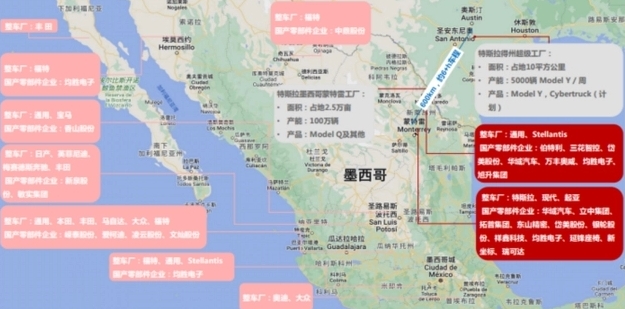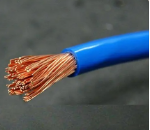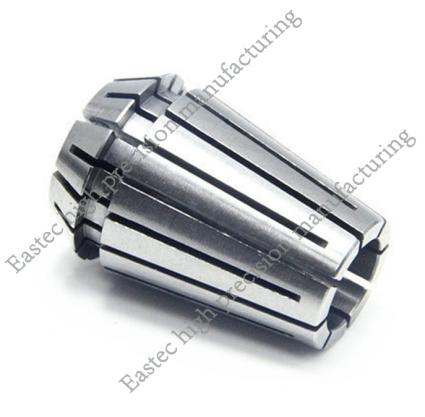
Chinese automakers including Beijing Automotive Group, Chery, and Chang'an Automobile are expanding their presence in Mexico, with A-share listed auto parts companies such as TuoPu Group, Xusheng Group, Bote Li, and Yinlun also following suit to establish factories there. This Mexican expansion has made it the largest market for China's vehicle exports in Latin America. Analysts suggest that Chinese manufacturing is accelerating its entry into Mexico, which is indeed driving revenue growth for some companies.
However, some analysts point out that the new US-Mexico-Canada trade agreement has made adjustments favoring the United States, and it remains challenging for Chinese automakers such as BMW and Tesla to share the market with global leaders like Volkswagen and Nissan.
In recent years, a cluster of Chinese automotive industry players including Beijing Automotive Group, MG, JAC, Chery, Jiangling, and Chang'an have been scrambling to Mexico to establish production and sales networks. Consulting firm优赛思claims that at least ten Chinese brands have announced their entry into the Mexican market in 2022 alone, and it is expected that another ten Chinese brands will enter Mexico in the future.
An important reason attracting many automotive industry players to land in Mexico is their proximity to potential markets. Products manufactured in Mexico have lower transportation costs to the North American market and can also cover the South American market. Additionally, Mexico boasts rich lithium resources, which are essential for electric vehicle batteries. Currently, Mexico's proven lithium reserves rank tenth globally, with 1700 thousand tons.
With the construction of factories by global automotive giants in Mexico, related Chinese auto parts suppliers are also facing the challenge of "going global." For example, Musk plans to produce a next-generation entry-level electric vehicle priced at $25,000 in Mexico. In order to partner with Tesla, Chinese supply chain companies are accelerating the establishment of factories in Mexico.
According to a research report by Huaxi Securities on June 28th, companies such as TuoPu Group, Xinquan Group, Xusheng Group, AI Koddy, Rongtai Co., Ltd., Bote Li, Sanhua Intelligence Control, Daiwei Auto Fittings Group Co., Ltd., Yinlun Co., Ltd., and Shangsheng Electronics have already started producing their own products in Mexico and supplying them to partners nearby to accelerate the globalization of their products.
The deepening cooperation between China and Mexico has made Mexico the largest market for China's vehicle exports in Latin America. In 2022, the total trade volume between China and Mexico reached $949.65 billion, up 9.8% year-on-year, indicating strong complementary advantages between the two economies.
According to a report from Jiemian News on September 7th, Guillermo Rossles, head of the Mexican Automobile Dealers Association, stated at a meeting of the Mexican Automobile Chamber that Chinese-made vehicles accounted for 19.4% of Mexican vehicle imports in the past eight months, up from 5.7% in 2018. The increase in inventory and faster delivery times have helped Mexico meet growing demand and made the Mexican market more competitive among auto brands.
However, some analysts point out that although Mexico has many advantages, it also poses certain policy and market risks. These risks involve security, operations, infrastructure, labor, regulations, and other aspects that may pose challenges to foreign investors. Despite Mexico's tremendous market potential, how to adapt and seize this market is also a major challenge.
Another issue is brand strength. Chinese cars have not yet gained a significant foothold overseas or achieved significant high-end successes. In the Mexican market, it remains to be seen how Chinese automakers will perform.
What is often overlooked is that the new US-Mexico-Canada trade agreement has made changes favoring the United States compared to the previous North American Free Trade Agreement (NAFTA). For example, the United States has set an annual export quota of 2.6 million vehicles for each of Canada and Mexico under NAFTA provisions for auto imports from these countries. In other words, Chinese car companies will have to compete with global leaders such as Volkswagen and Nissan for a share of this market. However, these competitors have already established strong roots in the Mexican market and will pose stiff competition for Chinese car companies entering this market.
Some industry insiders point out that the US market is crucial for any automaker's global strategy. It has long been the world's second-largest automotive market and remains so today despite high tariffs and trade restrictions that limit Chinese car exports to the United States. However, by virtue of its proximity to the US market and preferential trade agreements with NA





 Customer service 1
Customer service 1  Customer service 2
Customer service 2